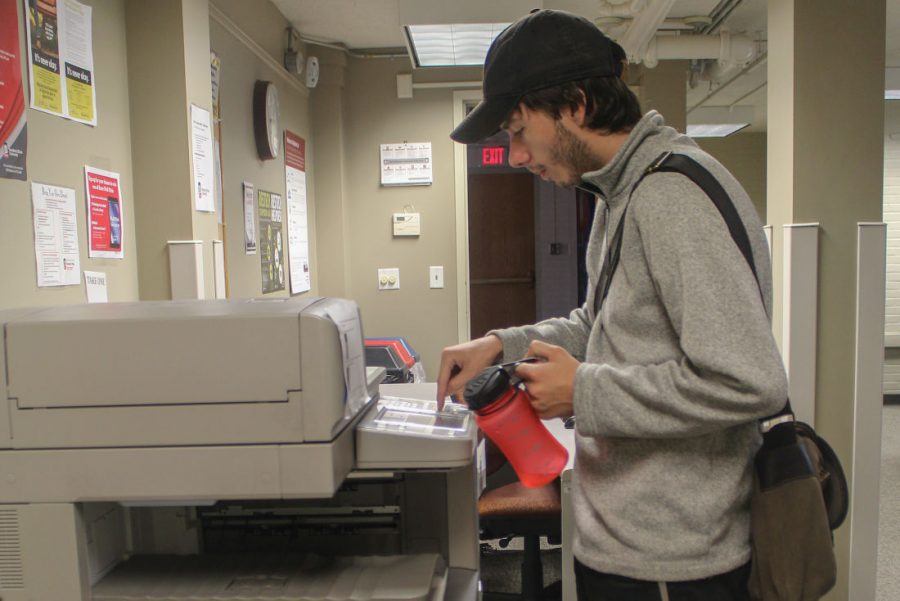SA task force to reduce paper printing
David Sadkowski, sophomore theatre arts design and technology, uses the Anywhere Printer located in the Neptune computer lab.
October 22, 2015
The Eco-Friendly and Sustainable Printing Task Force is creating tech workshops to prepare NIU for the absence of the student printing subsidy next fall.
The task force will reduce paper printing while educating people on effective resource usage, said Dillon Domke, Student Association Senate Speaker. The group, which will consist of students and faculty, will have its next meeting by the end of October, Domke said.
“Our goal is to reduce the use of paper printing on campus, and these workshops will educate people on how to effectively use other sources that do not require as much material,” Domke said.
Students are allocated $7 a semester in printing, a 50 percent drop from the $14 allocated to students per semester in fall 2014 and spring 2015, which itself was a drop from the $21 allocated to students per semester in fall 2012 and spring 2013. Before fall 2012, students had unlimited printing for free.
The task force is constructing a pledge for students and faculty to sign this semester, agreeing to be conscious about how much paper they print or require to print, Domke said.
“Paper comes from trees, and, as we all know, trees are not an unlimited resource in our world,” Domke said. “It’s important that we make sure that not only we’re being fiscally responsible and not wasting dollars and cents, but that we are not wasting our environment either.”
Domke said decreasing the use of printing can help NIU save money because funding for the printing subsidy comes out of a budget that students don’t pay for, which takes away from other aspects that could be improved in the technology field.
Student Association director of Environmental Affairs
The SA Senate approved the cabinet position of a director of Environmental Affairs at its meeting Sunday, a position that coincides with the The Eco-Friendly and Sustainable Printing Task Force, Domke said.
“Our administration is dedicated to the progression of this campus and environmental wellness is undoubtedly a factor,” said SA President Nathan Lupstein.
During roundtable discussions about the environment at the National Campus Leadership Council, a national student body president conference in June, Lupstein said he noticed NIU was one of the few schools that did not have an environmental affairs position.
“We have a few committees within the University Council, within administration that focus on environment, but there’s no chief position for it,” Lupstein said.
The job description for the director position was drafted in collaboration with Robert Kreml, SA Senate Deputy Speaker, Lupstein said.
The responsibilities of the director of Environmental Affairs may include hosting sustainability workshops for student organizations and the surrounding community as well as coordinating service projects for the student body and supporting campus environmental organizations, Lupstein said. The SA has been meeting with the Institute for the Study of Environmental Sustainability and Energy to make sure everything put forth for the position will affect the campus in a beneficial way, Lupstein said.
The SA expects to fill the position by the end of the semester, Lupstein said.
“This year, this administration is all about kind of bringing the SA to the forefront of progression and making sure that we are at the forefront of social issues, environmental issues, you know political issues,” Lupstein said. “We want to make sure that we are advocating for students in every aspect.”







